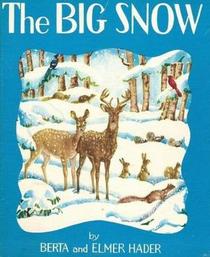Helpful Score: 2
This 1949 Caldecott Award winning book--for illustrations--has stood the test of time and still finds appeal among today's children.
New teachers and parents may not be aware of this timeless classic which can be used with primary age students in talking about late autumn, deep winter or even Groundhog's Day! Although the animals have anthropomorphic qualities, their speech is congruent with what they would actually be "thinking" during this season. For example, Mrs. Chipmunk says, "...it's getting cold. It's time for me to retire." It's not as corny as it sounds, and any adult reading "The Big Snow" aloud to children may want to give each animal's "voice" a quality resembling its actual sound.
This children's classic works on many levels, not the least of which is connecting today's children with a book loved by many previous generations.
New teachers and parents may not be aware of this timeless classic which can be used with primary age students in talking about late autumn, deep winter or even Groundhog's Day! Although the animals have anthropomorphic qualities, their speech is congruent with what they would actually be "thinking" during this season. For example, Mrs. Chipmunk says, "...it's getting cold. It's time for me to retire." It's not as corny as it sounds, and any adult reading "The Big Snow" aloud to children may want to give each animal's "voice" a quality resembling its actual sound.
This children's classic works on many levels, not the least of which is connecting today's children with a book loved by many previous generations.
A Caldecott Medal winner.
The animals get ready for winter, and the geese leave. An older couple provides food for the animals that stay behind during the long, hard winter.
Ages 5-8 or so.
The animals get ready for winter, and the geese leave. An older couple provides food for the animals that stay behind during the long, hard winter.
Ages 5-8 or so.




